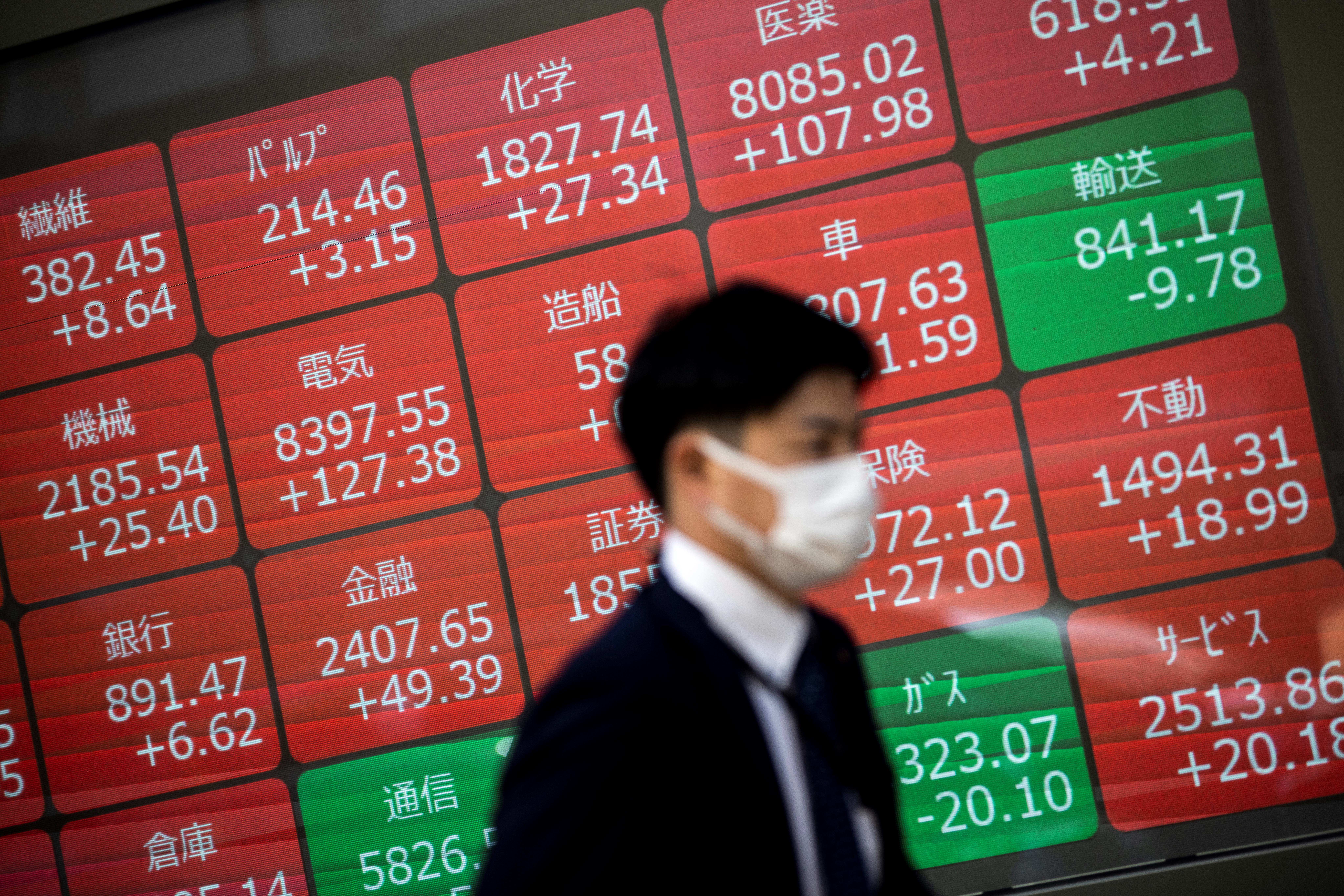
(Photo by Behrouz MEHRI / AFP)
HONG KONG – Asian markets took another blow Friday after Federal Reserve boss Jerome Powell failed to soothe fears of a surge in inflation fuelled by the expected global economic recovery, which many warn could force the central bank to hike interest rates earlier than thought.
While the rollout of vaccines, slowing infections, easing of lockdowns and an imminent new stimulus are breathing life back into economies, investors are increasingly worried ultra-loose monetary policies — a key pillar of a year-long equity surge — will be wound down to deal with an expected spike in prices.
That has led to a sharp sell-off across world markets with the tech-rich Nasdaq on Thursday almost sinking into correction territory — a 10 percent drop from recent highs — having touched a record peak last month.
Powell reiterated that the Fed would not tighten its policies until its goals of full employment and consistently high inflation had been met, and that was likely to be some time away.
As the economy recovers, he said “you could see prices moving up” but those increases are likely to be transient. “And this is a difference between a one-time surge in prices and ongoing inflation.”
Mona Mahajan, at Allianz Global Investors, said: “It makes logical and intuitive sense that Treasury yields should move back up to 1.50 percent or two percent, but we are concerned with the rest of the market about the speed at which it’s getting there”.
However, while Powell said the Fed was ready to step in when needed, traders were left disappointed that he did not indicate the bank would act on the rise in yields such as increasing its bond purchases.
The yield on benchmark 10-year US Treasuries spiked back above 1.5 percent at a one-year high after his comments — yields rise as prices fall, and investors are rushing out of the assets as inflation would eat into the returns they get on them.
“The market was seemingly looking for Powell to push back harder on the recent increase in yields,” said National Australia Bank’s Ray Attrill.
‘Hostage’ to cheap money
US markets extended the week’s losses, with the Nasdaq down more than two percent — tech firms are more susceptible to higher rates — while the Dow and S&P 500 dropped more than one percent.
And the selling bled through to Asia, where Tokyo fell two percent, while Hong Kong, Seoul and Sydney shed more than one percent. Shanghai, Singapore, Wellington, Taipei, Manila and Jakarta were also well in the red.
Axi’s Stephen Innes said Powell’s commitments also appeared to be weaker than previous statements, which “rather implies that two percent (yields) and heading to 2.2 percent might be enough to see them hike rates. The market was not ready for that”.
“Investors are worried about the perpetual printing machines of easy monetary policy throttling down.”
The rise in yields “and the risk asset reaction perfectly illustrates just how hostage investors have worryingly become (to) easy money policies”.
Adding to the selling pressure is a worry that the year-long rally in markets may have run its course and some stocks were overpriced, leaving them open for profit-taking.
Comments from a top Chinese central bank official this week that there were bubbles forming in parts of the world that were likely to pop left trading floors suspecting Beijing will not be flooding the world’s number two economy with stimulus cash, particularly as it said Friday it expects growth this year of more than six percent.
Oil prices edged even higher after surging more than four percent to around 14-month highs Thursday on a surprise decision by OPEC and its major allies to maintain output cuts until April.
“Oil prices could rip higher now that a tight market is likely up through the summer,” said OANDA’s Edward Moya. “WTI at $75 no longer seems outlandish and Brent could easily top $80 by the summer.”
Investors are now keeping tabs on Joe Biden’s stimulus package as senators prepare to debate it, with a vote possible over the weekend, while the release of closely watched US jobs data later in the day will give the latest snapshot of the world’s top economy.
Key figures around 0230 GMT
Tokyo – Nikkei 225: DOWN 2.0 percent at 28,359.11 (break)
Hong Kong – Hang Seng: DOWN 1.5 percent at 28,792.34
Shanghai – Composite: DOWN 0.6 percent at 3,483.56
Euro/dollar: DOWN at $1.1955 from $1.1967 at 2200 GMT
Pound/dollar: DOWN at $1.3880 from $1.3894
Euro/pound: UP at 86.13 pence from 86.12 pence
Dollar/yen: DOWN at 107.93 yen from 107.95 yen
West Texas Intermediate: UP 0.6 percent at $64.23 per barrel
Brent North Sea crude: UP 0.7 percent at $67.20 per barrel
New York – Dow: DOWN 1.1 percent at 30,924.14 (close)
London – FTSE 100: DOWN 0.4 percent at 6,650.88 (close)